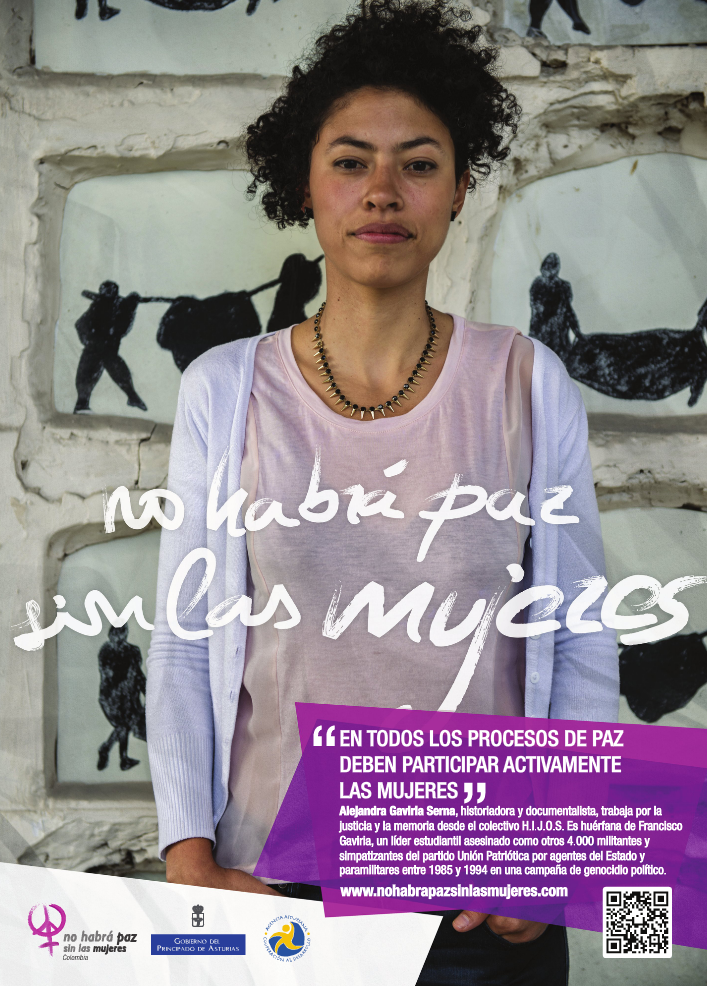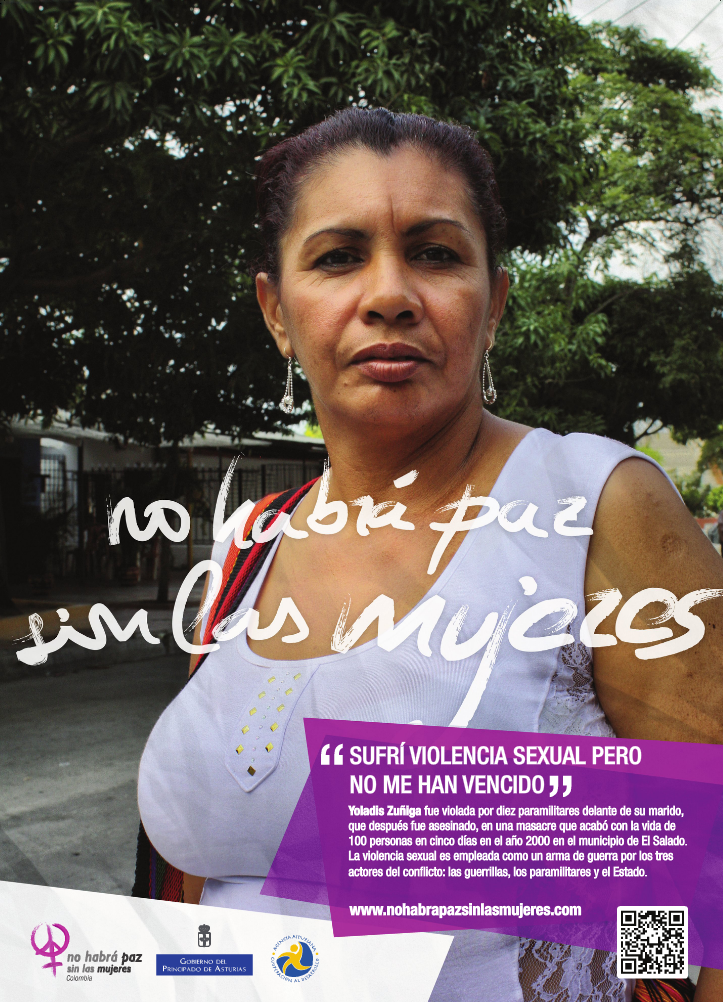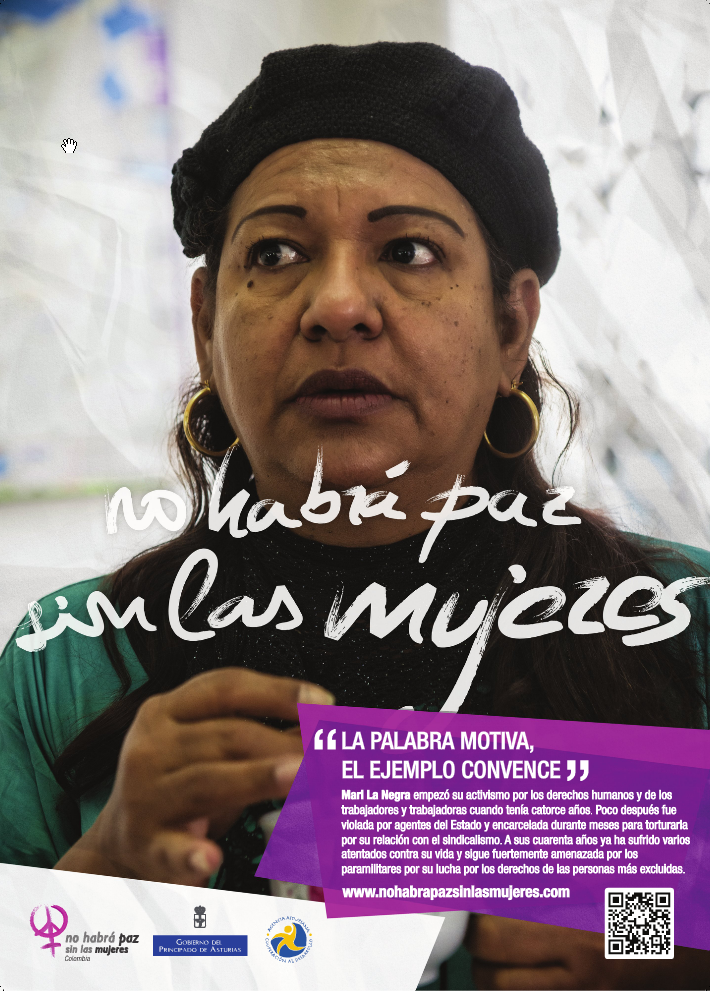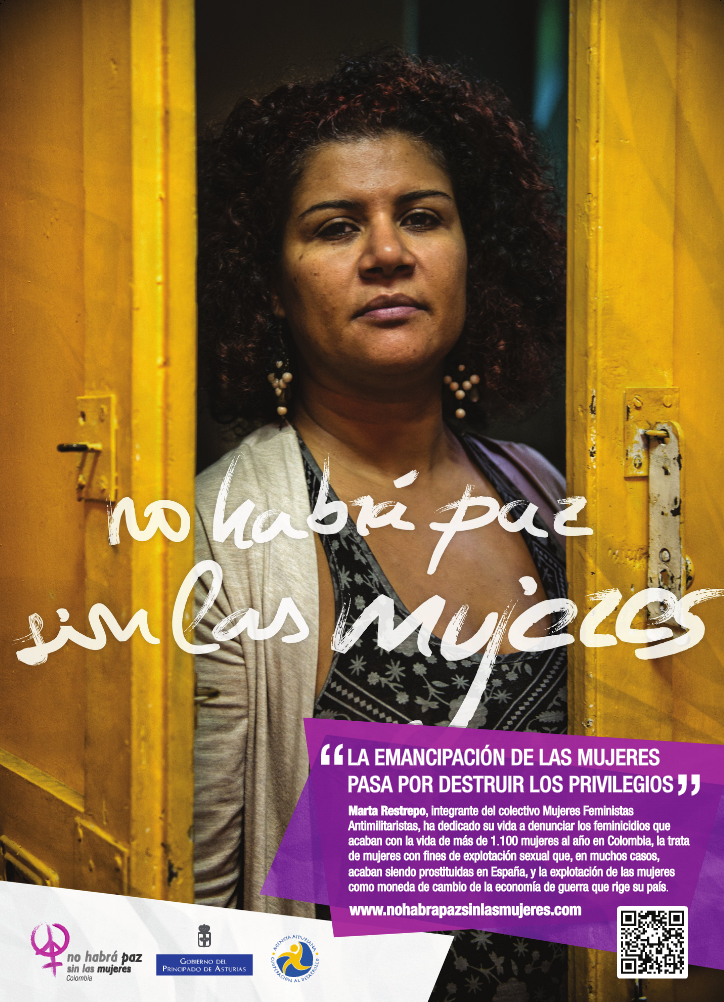[Links are to Spanish-language pages except where noted otherwise.]
The documentation centre No habrá paz sin las mujeres [There will be no peace without women] enables female leaders, professionals and survivors of the armed conflict in Colombia to express themselves and share their experiences so that, according to the website, “the lifework they have dedicated to peace is not forgotten.” Their testimony is offered through an online photography exhibition and video interviews.

Alejandra Garcia Serna, historian and documentary filmmaker. Poster for the project “There will be no peace without women”.
All peace processes should actively involve women.
Alejandra Garcia Serna, a historian and documentary filmmaker, also works for justice and memory as part of the H.I.J.O.S. cooperative. She is the orphaned daughter of Francisco Gaviria, a student leader murdered along with 4,000 militants and sympathizers of the Unión Patriótica by State agents and paramilitaries between 1985 and 1994 in a campaign of political genocide.
The project, created by the Asturian Cooperative Development Agency, gives voice to Colombian women so they can “learn from each other's experiences and strategies, be empowered in the fight to build a more just society, and advance their own proposals for peace in the process of reconciliation, reconstruction, reparation and justice.“
No habrá paz sin las mujeres began with the experiences of Colombian women during the armed conflict [en] that has endured for more than 50 years. The group maintains that, although there are signs of hope in ongoing peace talks [en] taking place in Havana, Cuba, between the FARC (Revolutionary Armed Forces of Colombia) [en] and the Colombian government, “women are noticeably absent from the peace process: neither the issues crucial to them nor their claims or proposals for peace are being listened to.”
The website goes on to explain that talks have not taken into account United Nations Resolution 1325 [en], which calls attention to the issue of gender in conflict resolution.
Y precisamente son las mujeres las que más sufren las consecuencias de la guerra: la violencia sexual ha sido empleada por los tres actores de la guerra, los paramilitares, el Estado y la guerrilla; el reclutamiento de menores ha afectada a las niñas como combatientes pero también como esclavas sexuales; son el mayor porcentaje de población desplazada y la mayoría con cargas familiares…
It is women who suffer most from the consequences of war: sexual violence has been used by all three factions, the paramilitary, the State and the guerrillas; the recruiting of minors has damaged girls both as combatants and as sex slaves; displaced persons are disproportionately women, most of whom have families…
Efforts to help redress the situation are publicized on the website's home page through video interviews and testimonials.
One of these videos is about the artist Patricia Ariza, who found a way to express the Colombian reality through her work. Patricia also uses artistic expression to exorcize the injustice she sees in her country and of which she herself is a victim, her family having been displaced because of the violence.
Another video shows a campaign where Colombian women are committed to safekeeping their land and not allowing the multinational AngloGold Ashanti to set up gold-mining operations. The following video is an interview with a local woman, Judith Pérez Gutiérrez, who lives on a country road in the municipality of Cajamarca, Tolima; and it speaks to the dedication of women to protecting their surroundings.
Moreover, the interview reveals the fear and anxiety of Pérez Gutiérrez and her neighbours—the vulnerability and lack of support they feel at the hands of Colombian authorities, as evidenced by the serious confrontations they have had with security forces:
Ester Carmen Martínez, a teacher in Pitalito, Huila, [a major coffee-producing area] tells her personal story and that of her neighbours, who were murdered, evicted or displaced by paramilitary groups.
The project also publishes texts such as this one, which explains some of the dangers faced by women who choose activism:
En Bajo Cauca por lo menos otras cuatro líderes han sido amedrentadas y obligadas a abandonar la región en los últimos cuatro años. La restitución no avanza, y el miedo hace que ni siquiera reúnan las mesas de víctimas.
[…]
“Las víctimas estamos arrinconadas”, dijo el testigo consultado. “Hay muchas amenazas. La última fue contra una mujer que fue víctima de desplazamiento forzado y se fue para el barrio París. Allá lideró la junta de acción comunal y los pillos la amenazaron nuevamente y hasta iban a atentar contra su vida y se tuvo que ir del municipio. Lo más triste es que ni la Administración Municipal ni la Fuerza Pública atiende nuestras peticiones. ¿Usted cree que alguna de nosotras, pese a las amenazas, tiene esquema de seguridad?”
In Bajo Cauca at least four other leaders have been intimidated and forced to abandon the region in the last four years. Restitution is no further ahead, and fear means the victims don't even dare meet together anymore.
[…]
“We victims are cornered,” said the witnessed we consulted. “There are many threats. The last was against a woman who was a victim of forced displacement and went to the París area. There she led the committee for communal action and the thugs threatened her again, they were even going to try to kill her, and she had to leave the town. The saddest part is that neither the municipal government nor public security paid attention to our petitions. Do you think that any of us, despite the threat, receives any protection?”
The project has several posters depicting the reality of the many ways women suffer, in particular sexual violence.

Yoladis Zúñiga, survivor of the massacre in El Salado (Photo: Patricia Simón)
I suffered sexual violence but it did not defeat me.
Yoladis Zúñiga was raped by ten paramilitaries in front of her husband, who was later murdered, in a massacre that claimed the lives of 100 people in five days in the town of El Salado in 2000. Sexual violence is used as a weapon of war by all three factions in the conflict: guerrillas, paramilitaries and the State.
The posters also highlight the work of women who have dedicated their lives to peace and activism.

Mari La Negra, defender of human rights (Photo: Alex Zapico)
Words motivate, examples convince.
Mari La Negra began her career as an activist for workers and human rights when she was 14 years old. Not long afterwards, she was raped by State agents and jailed for three months, where she was tortured because of her efforts on behalf of organized labour. At 40, she has survived many attempts on her life and continues to be threatened by paramilitaries because of her fight for the rights of those most marginalized in society.

Marta Restrepo, feminist and community organizer (Photo: Alex Zapico)
Freedom for women means removing the right to take advantage of them.
Marta Restrepo, a member of Mujeres Feministas Antimilitaristas (Antimilitarist Feminist Women), has dedicated her life to exposing the murder of women, a plague that claims the lives of more than 1,100 victims a year in Colombia. She also militates against the use of women as sex slaves, which in many cases leads to them becoming prostitutes in Spain, and the exploitation of women as a form of currency in the war economy that rules her country.
For more information, videos, and posters, visit Facebook and Twitter @nopazsinmujeres.







1 comment